 76 citations,
June 2008 in “Journal of the American Academy of Dermatology”
76 citations,
June 2008 in “Journal of the American Academy of Dermatology” The conclusion is that certain scalp tissue changes are characteristic of lichen planopilaris, with mucinous perifollicular fibroplasia being a new feature for diagnosis.
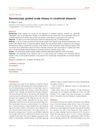 62 citations,
March 2012 in “Journal of the European Academy of Dermatology and Venereology”
62 citations,
March 2012 in “Journal of the European Academy of Dermatology and Venereology” Using dermoscopy to guide scalp biopsies is an effective way to diagnose cicatricial alopecia.
 59 citations,
September 2008 in “Journal of Burn Care & Research”
59 citations,
September 2008 in “Journal of Burn Care & Research” Nitric oxide gel helps heal skin burns faster by improving skin growth, hair regrowth, and blood vessel formation.
 54 citations,
December 2014 in “Wound Repair and Regeneration”
54 citations,
December 2014 in “Wound Repair and Regeneration” PRP injections may improve hair thickness and density in female hair loss patients.
 51 citations,
July 2008 in “Dermatologic Therapy”
51 citations,
July 2008 in “Dermatologic Therapy” The document concludes that surgery is a preferred treatment for cicatricial alopecia, with the method chosen based on individual factors and may require multiple sessions and careful postoperative care.
 50 citations,
December 2010 in “Dermatologic Surgery”
50 citations,
December 2010 in “Dermatologic Surgery” Laser treatment can stimulate hair growth for male pattern hair loss.
 46 citations,
June 2018 in “American Journal of Clinical Dermatology”
46 citations,
June 2018 in “American Journal of Clinical Dermatology” Hair loss is common in lupus patients and can be permanent or reversible, depending on the type, with various treatments available.
 38 citations,
February 2016 in “Surgery Journal”
38 citations,
February 2016 in “Surgery Journal” Facial plastic surgery has evolved to focus on less invasive techniques and innovative technologies for cosmetic and reconstructive procedures.
 35 citations,
November 2020 in “Experimental Dermatology”
35 citations,
November 2020 in “Experimental Dermatology” Different types of skin cells are organized in a special way in large wounds to help with healing and hair growth.
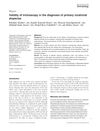 34 citations,
April 2016 in “International Journal of Dermatology”
34 citations,
April 2016 in “International Journal of Dermatology” Trichoscopy is a useful method for identifying primary cicatricial alopecias and their specific types.
 30 citations,
March 2015 in “Journal of Dermatology”
30 citations,
March 2015 in “Journal of Dermatology” Hair thickness differences help diagnose hair loss severity.
 22 citations,
August 2010 in “Annals of Plastic Surgery”
22 citations,
August 2010 in “Annals of Plastic Surgery” The study concluded that reconstructive surgery for burn alopecia should be tailored to the scar's size and quality, with different methods recommended for different cases.
 20 citations,
February 2019 in “Genes”
20 citations,
February 2019 in “Genes” The study concludes that mutations in the AEBP1 gene can cause a form of Ehlers-Danlos syndrome and should be considered in diagnosis.
 17 citations,
March 2006 in “BJU international”
17 citations,
March 2006 in “BJU international” Using buccal mucosa for hypospadias repair in children is effective and reduces complications.
 14 citations,
February 2020 in “Scientific reports”
14 citations,
February 2020 in “Scientific reports” Telocytes in the scalp may help with skin regeneration and maintenance.
 14 citations,
July 2009 in “Current Opinion in Otolaryngology & Head and Neck Surgery”
14 citations,
July 2009 in “Current Opinion in Otolaryngology & Head and Neck Surgery” Hair restoration techniques like follicular unit transplant surgery and follicular unit extraction are effective, with ideal graft placement density between 20-30 units per cm². Medications like Minoxidil and Finasteride can help maintain and regrow hair.
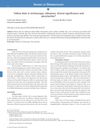 13 citations,
October 2017 in “Anais Brasileiros de Dermatologia”
13 citations,
October 2017 in “Anais Brasileiros de Dermatologia” Yellow dots in hair and scalp examinations are important for diagnosing different scalp conditions.
 13 citations,
January 2014 in “Dermatology”
13 citations,
January 2014 in “Dermatology” Radiation-induced alopecia after angioembolization usually heals on its own and can look like other hair loss types, but patient history helps prevent misdiagnosis.
 10 citations,
June 2020 in “Journal of Cosmetic Dermatology”
10 citations,
June 2020 in “Journal of Cosmetic Dermatology” Frontal fibrosing alopecia may be linked to genital Lichen sclerosus through an autoimmune process.
 9 citations,
January 2017 in “Journal of the Egyptian Women's Dermatologic Society (Print)”
9 citations,
January 2017 in “Journal of the Egyptian Women's Dermatologic Society (Print)” Fungal infection was the main cause of hair loss in Egyptian children studied.
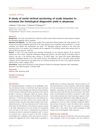 9 citations,
November 2009 in “Journal of the European Academy of Dermatology and Venereology”
9 citations,
November 2009 in “Journal of the European Academy of Dermatology and Venereology” Cutting scalp biopsies in consecutive slices improves diagnosis of hair loss conditions.
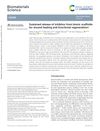 8 citations,
January 2020 in “Biomaterials Science”
8 citations,
January 2020 in “Biomaterials Science” Researchers developed a scaffold that releases a healing drug over time, improving wound healing and skin regeneration.
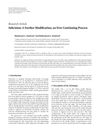 8 citations,
January 2012 in “Dermatology Research and Practice”
8 citations,
January 2012 in “Dermatology Research and Practice” New subcision technique with a bent needle and syringe improves ease, effectiveness, and comfort for treating acne scars.
 7 citations,
August 2018 in “The American Journal of Dermatopathology”
7 citations,
August 2018 in “The American Journal of Dermatopathology” Researchers found a new early sign of Frontal Fibrosing Alopecia that could help avoid misdiagnosis.
 6 citations,
November 2018 in “Histochemistry and Cell Biology”
6 citations,
November 2018 in “Histochemistry and Cell Biology” Mongolian gerbils heal wounds differently than mice, with unique protein levels and gene expression that affect skin repair.
 6 citations,
June 2018 in “Journal of Stomatology, Oral and Maxillofacial Surgery”
6 citations,
June 2018 in “Journal of Stomatology, Oral and Maxillofacial Surgery” Nanofat grafting is better for delicate areas and combining it with lipofilling might improve hair loss treatment.
 5 citations,
April 2021 in “Biomedicines”
5 citations,
April 2021 in “Biomedicines” The engineered skin substitute helped grow skin with hair on mice.
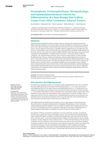 5 citations,
August 2020 in “Curēus”
5 citations,
August 2020 in “Curēus” The document concludes that recent studies help tell apart desmoplastic trichoepitheliomas from other skin tumors, but more research is needed for clear differentiation.
 5 citations,
October 2012 in “Expert Review of Dermatology”
5 citations,
October 2012 in “Expert Review of Dermatology” Trichoscopy is a useful tool for diagnosing hair and scalp diseases without needing skin biopsies.
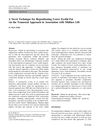 5 citations,
February 2011 in “Aesthetic Plastic Surgery”
5 citations,
February 2011 in “Aesthetic Plastic Surgery” The new technique for repositioning lower eyelid fat with a midface lift is easier, faster, and has better results with fewer complications.






























